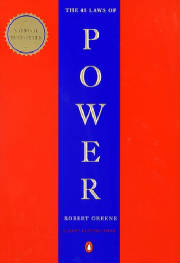|

"Learning the game of power requires a certain way of looking at the world, a shifting of perspective," writes Robert
Greene. Mastery of one's emotions and the arts of deception and indirection are, he goes on to assert, essential. The 48 laws
outlined in this book "have a simple premise: certain actions always increase one's power ... while others decrease it and
even ruin us."
The laws cull their principles from many great schemers--and scheming instructors--throughout history, from Sun-Tzu to
Talleyrand, from Casanova to con man Yellow Kid Weil. They are straightforward in their amoral simplicity: "Get others to
do the work for you, but always take the credit," or "Discover each man's thumbscrew." Each chapter provides examples of the
consequences of observance or transgression of the law, along with "keys to power," potential "reversals" (where the converse
of the law might also be useful), and a single paragraph cleverly laid out to suggest an image (such as the aforementioned
thumbscrew); the margins are filled with illustrative quotations. Practitioners of one-upmanship have been given a new, comprehensive
training manual, as up-to-date as it is timeless.
From Publishers Weekly
Greene and Elffers have created an heir to Machiavelli's Prince, espousing principles
such as, everyone wants more power; emotions, including love, are detrimental; deceit and manipulation are life's paramount
tools. Anyone striving for psychological health will be put off at the start, but the authors counter, saying "honesty is
indeed a power strategy," and "genuinely innocent people may still be playing for power." Amoral or immoral, this compendium
aims to guide those who embrace power as a ruthless game, and will entertain the rest. Elffers's layout (he is identified
as the co-conceiver and designer in the press release) is stylish, with short epigrams set in red at the margins. Each law,
with such allusive titles as "Pose as a Friend, Work as a Spy," "Get Others to Do the Work for You, But Always Take the Credit,"
"Conceal Your Intentions," is demonstrated in four ways?using it correctly, failing to use it, key aspects of the law and
when not to use it. Illustrations are drawn from the courts of modern and ancient Europe, Africa and Asia, and devious strategies
culled from well-known personae: Machiavelli, Talleyrand, Bismarck, Catherine the Great, Mao, Kissinger, Haile Selassie, Lola
Montes and various con artists of our century. These historical escapades make enjoyable reading, yet by the book's conclusion,
some protagonists have appeared too many times and seem drained. Although gentler souls will find this book frightening, those
whose moral compass is oriented solely to power will have a perfect vade mecum [a book for ready reference]. BOMC and Money
Book Club alternates. Author tour.
|

